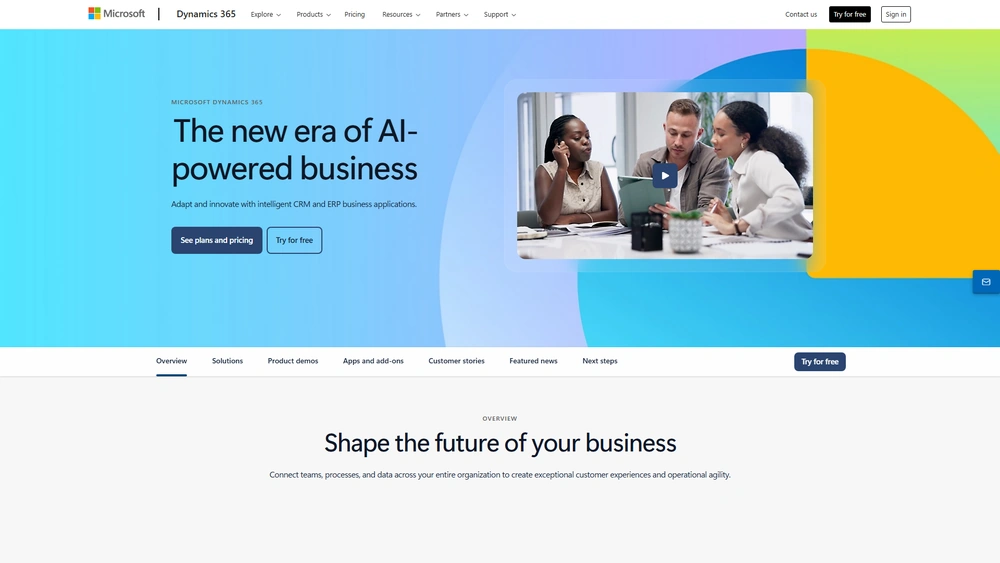Microsoft Dynamics 365 Sales Overview & 2025 Industry Position
Microsoft Dynamics 365 Sales is a cloud-based CRM solution geared toward empowering sales teams to build stronger customer relationships, accelerate deal closures, and increase revenue with confidence. As a core component of the Microsoft Dynamics 365 suite, the Sales module integrates closely with other Microsoft services, including Teams, Outlook, Power BI, and Azure, giving it powerful synergy in enterprise ecosystems.
In 2025, Microsoft Dynamics 365 Sales is not just a sales automation tool; it’s a strategic hub for AI-driven sales forecasting, automated lead scoring, and dynamic engagement strategies grounded in data. With real-time insights and increasingly intelligent workflows, it positions itself as a front-runner in the rapidly evolving B2B CRM landscape.
From Launch to 2025: Microsoft Dynamics 365 Sales’s Journey
Originally launched as Microsoft Dynamics CRM in 2003, Microsoft’s foray into enterprise customer relationship management has undergone several notable updates and rebrandings. In 2016, Microsoft Dynamics 365 refocused the product into modular SaaS apps, with “Sales” becoming one of the flagship services. Key milestones include:
- 2003: Initial release of Microsoft CRM v1.0
- 2011: Integration with Office 365 and cloud hosting begins
- 2016: Rebranding to Dynamics 365, with a modular approach
- 2019: Enhanced AI capabilities introduced with Sales Insights
- 2022: Microsoft Viva Sales launched to embed CRM data into productivity workflows
- 2024: Copilot for Sales preview, bringing generative AI directly into the CRM UI
2025 strategy thesis: Microsoft Dynamics 365 Sales aims to centralize AI-powered revenue intelligence for mid-to-large enterprises by unifying CRM, automation, and predictive analytics in a highly integrated workspace.

Microsoft Dynamics 365 Sales Key Features
As of 2025, the platform is packed with a host of features designed to streamline the sales process and improve team productivity:
- Sales Copilot: Embedded AI assistant offering real-time recommendations, email drafting, and note summarization
- Predictive Forecasting: Uses historical data and AI to project future revenue and deal likelihoods
- Relationship Analytics: Scores customer interactions and reveals relationship health indicators
- Sales Accelerator: Provides prioritized work lists tailored to rep behavior and deal stage
- Advanced Lead Scoring: Assigns opportunity scores based on interaction frequency, source, and demographic data
- Mobile CRM: Fully featured mobile experience with offline access, AI prompts, and geo-tagging
Workflow & UX
Microsoft Dynamics 365 Sales offers a clean, modern interface with deep customization options. Its strongest user-experience qualities include:
- Scenario-Based Navigation: Start from objectives—like nurturing a lead or closing a deal—with suggestive next-actions
- Contextual Insights: Embedded data tips and engagement history appear automatically within contact or opportunity records
- Copilot Pane: AI assistant lives on every screen, summarizing emails, surfacing actions, and recommending outreach
- Tight MS 365 Integration: Work inside Teams or Outlook without shifting systems
Microsoft Dynamics 365 Sales Pricing Analysis & Value Metrics
Pricing as of July 2025 (Tier: Monthly per User):
| Plan | Price | Includes |
|---|---|---|
| Sales Professional | $65 | Opportunity mgmt, contact database, LinkedIn integration |
| Sales Enterprise | $95 | Pro + forecasting, lead scoring, automation, Copilot |
| Sales Premium | $130 | Enterprise + Sales Insights, advanced AI modeling |
| Relationship Sales | $162 | Premium + LinkedIn Sales Navigator |
Value Assessment: Advanced AI features justify higher-tier costs for data-savvy enterprises. The Professional plan covers SMBs with simpler sales cycles.
Competitive Landscape
How Microsoft Dynamics 365 Sales compares in 2025:
| Platform | Strengths | Ideal Users |
|---|---|---|
| Dynamics 365 Sales | AI forecasting, tight Microsoft 365 integration | Mid-enterprise, Microsoft-based orgs |
| Salesforce Sales Cloud | Customization, AppExchange, Vertical support | Large-scale enterprises |
| HubSpot Sales Hub | Ease of use, free tier, marketing automation | SMBs, startups |
| Zoho CRM | Affordability, modular tools | Cost-conscious SMEs |
Use Cases in Practice
Microsoft Dynamics 365 Sales is ideal for:
- B2B Enterprises: Selling complex solutions with longer cycles and layered stakeholders
- Tech Firms: Integrates with Azure and Power Platform for custom automations
- Professional Services: Supports multiple pipelines with cross-department input
- Field Sales Teams: Excellent mobile tools and geolocation support
Integrations That Matter
Key integrations include:
- Microsoft 365: Teams, Outlook, Excel, OneDrive, SharePoint
- Power Platform: Power Automate for workflows, Power Apps for customization
- LinkedIn Sales Navigator: Natively connects for prospecting and profile insights
- Third-party apps: DocuSign, Adobe Sign, Mailchimp, Slack, QuickBooks
Pros & Cons
- Pros: AI-first engagement, security via Azure, seamless MS ecosystem fit, scalable platform
- Cons: Steep learning curve, costlier than basic CRMs, UI complexity for new users
Pro Tip: For best results, embed Microsoft Dynamics 365 Sales directly in Teams with Copilot activated—it reduces switching and increases pipeline momentum.
Final Thoughts
Microsoft Dynamics 365 Sales is best suited for mid-size to large companies with established Microsoft infrastructure. Its depth and intelligence tools resonate with sales teams managing volume and complexity. While it may present a learning curve, the broad utility, ecosystem integration, and predictive intelligence give it standout value for long-term CRM ROI.
Microsoft Dynamics 365 Sales FAQ
It’s a sales solution within the Dynamics 365 suite that helps companies manage customer relationships, track sales activity, and close deals through AI-enhanced tools.
Yes, especially the Sales Professional plan, which offers core CRM features ideal for small to midsize teams with simpler processes.
Copilot offers AI-suggested next steps, drafts emails, summarizes customer calls, and contextualizes CRM data for more efficient selling.
Yes, via the Relationship Sales plan, users can access and engage prospects through LinkedIn Sales Navigator directly within CRM workflows.
Microsoft offers ticket support, community forums, learning paths via Microsoft Learn, and additional Success Services for enterprise plans.